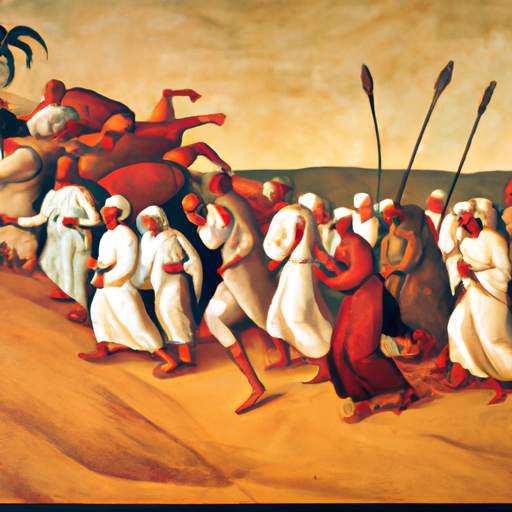This blogpost explores the unique culture, experiences, and impact of Israeli diaspora communities spread across the globe. Delving into the history, influence, and challenges these communities face, we aim to provide a comprehensive understanding of their significant role in shaping global society and the State of Israel.
The Historical Journey of the Israeli Diaspora: How did it all begin?
The history of the Israeli Diaspora dates back thousands of years, tracing its roots to the forced exile of the Jewish people from their homeland of Israel. The first major diaspora occurred in 586 BCE when the Babylonians conquered the Kingdom of Judah and destroyed the First Temple in Jerusalem, leading to the deportation of many Jews to Babylon. This event marked the beginning of a long history of dispersion and migration for the Jewish people.
Over the centuries, Jewish communities spread across the world, establishing themselves in various countries and regions. The diaspora continued to grow as Jews faced persecution, discrimination, and expulsion from different countries. Despite these challenges, Jewish communities managed to thrive and adapt, preserving their cultural and religious traditions while also integrating with their host societies.

Historical image illustrating the early migration of Israelis.
“Diversity and Unity: How do Israeli Diaspora communities maintain their identity in foreign lands?”
Israeli Diaspora communities maintain their identity in foreign lands through a delicate balance of preserving their cultural heritage while adapting to their surroundings. One key aspect of maintaining their identity is through the preservation of traditions, language, and religious practices passed down through generations. These cultural elements serve as a strong foundation that binds the community together and reinforces their connection to Israel. Additionally, Israeli Diaspora communities often establish cultural centers, schools, and synagogues that serve as hubs for preserving their identity and fostering a sense of belonging among members. These institutions provide a space for community members to come together, celebrate holidays, and participate in cultural events that strengthen their ties to their Israeli roots.
Moreover, maintaining a strong sense of unity within the Israeli Diaspora is essential for preserving their identity. Community members often actively engage in social, political, and philanthropic activities that promote solidarity and cohesiveness. By working together towards common goals and supporting each other in times of need, Israeli Diaspora communities build a sense of unity that transcends geographical boundaries. This unity is further reinforced through networks of communication, both in-person and online, that allow community members to stay connected, share resources, and collaborate on various initiatives. Ultimately, the combination of cultural preservation, community institutions, and a strong sense of unity enables Israeli Diaspora communities to maintain their identity and thrive in foreign lands.
The Challenges Faced: Are Israeli Diaspora communities losing their cultural roots?
Israeli Diaspora communities face a myriad of challenges that threaten to erode their cultural roots over time. One significant challenge is the pressure to assimilate into the dominant culture of their host country, which can lead to the dilution of their distinct Israeli identity. As community members navigate the complexities of living in a foreign land, they may find themselves compromising on traditional practices and customs in order to fit in, potentially resulting in a loss of cultural heritage. Additionally, the younger generation growing up in diaspora communities may struggle to maintain a strong connection to their Israeli roots amid the influence of Western culture and globalization. This generational shift poses a risk of cultural erosion as traditions and values may not be passed down as effectively as in previous generations.
Furthermore, the dispersion of Israeli Diaspora communities across different countries and continents can create challenges in preserving a cohesive cultural identity. The diversity of experiences and influences within these communities can lead to fragmentation and a lack of uniformity in cultural practices and beliefs. As a result, there may be a sense of disconnection and disunity among community members, making it difficult to collectively uphold their cultural roots. Moreover, external factors such as political tensions and conflicts related to Israel can also impact the cultural cohesion of diaspora communities, causing internal divisions and strains on their sense of identity. Addressing these challenges requires a concerted effort to actively engage with the younger generation, strengthen community bonds, and adapt cultural practices to the evolving needs of Israeli Diaspora communities.

A poignant picture showing an Israeli Diaspora community grappling with cultural assimilation.
“The Influence Factor: How does the Israeli Diaspora impact Israel and the world?”
The Israeli Diaspora plays a crucial role in shaping both Israel and the global landscape through its diverse contributions and influence. One significant way in which the diaspora impacts Israel is through its support networks and connections, providing a bridge between the homeland and the diaspora communities around the world. This network serves as a valuable resource for Israel in terms of fostering economic partnerships, cultural exchanges, and advocacy efforts on an international scale. Additionally, the Israeli Diaspora often serves as ambassadors for Israel, promoting a positive image of the country and countering negative stereotypes through their interactions with individuals and communities in their host countries.
Furthermore, the Israeli Diaspora’s influence extends beyond the borders of Israel, impacting the world in various spheres such as technology, innovation, and arts. Many members of the diaspora have excelled in their respective fields, contributing to advancements in science, business, and the arts on a global scale. Their success stories serve as inspiration for future generations and highlight the talent and creativity that emanate from Israeli roots. Moreover, the cultural diversity and perspectives brought by the diaspora enrich the global community, fostering cross-cultural understanding and dialogue. By leveraging their knowledge, skills, and networks, the Israeli Diaspora continues to make a significant impact on Israel and the world, shaping the collective narrative and forging connections that transcend geographical boundaries.
In conclusion, Israeli diaspora communities, with their rich heritage and diverse experiences, play a critical role in shaping global perspectives about Israel. They continue to forge a distinctive path, fostering a cross-cultural dialogue and contributing significantly to their adopted nations.
